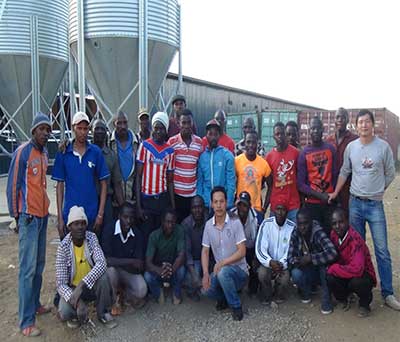Generally speaking, there are many chicken feed additives, like antibiotic additives, deworming health additives, antioxidants, mildew inhibitors, Chinese herbal medicine additives, hormones, and enzyme preparations etc.
Although these additives do not contain the nutrients required by chickens, they are of great benefit to promoting the growth and development of chickens, improving egg production, enhancing disease resistance and feed storage.
Antibiotic additive
Antibiotics have bacteriostatic effect. When some antibiotics are added to the diet of chicken as additives, they can inhibit the activity of harmful bacteria in the intestinal tract of chickens. They can resist a variety of respiratory and digestive system diseases, improve feed utilization, and promote weight gain and egg production. The effect is more pronounced when the chicken is in adversity. Commonly used antibiotic additives are penicillin, oxytetracycline, chlortetracycline, neomycin, tylosin and so on.
When using antibiotic additives, attention should be paid to the alternating action of several antibiotics, so as to prevent harmful microorganisms in the chicken intestines from developing drug resistance and reducing the control effect. In order to avoid drug resistance and excessive product residues, it should be used at intervals, and the added amount should be strictly controlled, and antibiotics shared by humans and animals should be used sparingly or with caution.
Insect repellent health additive
Among the parasitic diseases of chickens, coccidiosis has a high incidence and great harm, so special attention should be paid to prevention. Commonly used anticoccidial drugs are sitrine, amproline, salinomycin, monensin, and chlorpheniramine, etc., which should also be used alternately to avoid drug resistance.

Antioxidants
In the process of feed storage, adding antioxidants can reduce the oxidative loss of nutrients such as vitamins and fats. For example, adding 200 grams of sandoquine per ton of feed, and storing for one year, the carotene will lose 30%, while the loss of no antioxidants will be 70%. The addition of antioxidants to the fatty fish meal can maintain the digestibility of the original crude protein, and the digestion, absorption and utilization efficiency of various amino acids is not affected. Commonly used antioxidants are sandoquine, ethylated hydroxytoluene, butylated hydroxytoluene, etc. The general addition amount is 100 mg to 150 mg per kilogram.
Mildew inhibitor
In the process of feed storage, in order to prevent the feed from becoming moldy and deteriorating, and to maintain good palatability and nutritional value, a mildew inhibitor can be added to the feed. Commonly used antifungal agents are sodium propionate, calcium propionate, sodium dehydroacetate, gram mold and so on. The addition amount is: sodium propionate per ton of feed plus 1 kg; calcium propionate per ton of feed plus 2 kg; sodium dehydroacetate per ton of feed plus 200 grams to 500 grams.
Egg yolk coloring agent
After adding egg yolk colorant to the feed, it can improve the color of egg yolk, that is, the color of egg yolk changes from light yellow to dark yellow. Commonly used egg yolk colorants are lutein, Lukangding, red pepper powder and so on. Such as adding 200 grams to 300 grams of red pepper powder per 100 kilograms. Continuous feeding for half a month can keep the yolk dark yellow for 2 months, and at the same time can increase the chicken’s appetite and increase the egg production rate.
Detailed introduction of cold-resistant feed additives for chickens
In the process of raising chickens, because chickens like hot weather and avoid cold, during the cold and low temperature season, their physique and production performance will decline, their consumption will increase, their egg production will decrease, and they will be prone to respiratory infectious diseases such as colds. If appropriate additives are added to the feed, the cold resistance of chickens can be enhanced. So, what are the cold-resistant feed additives for chickens? Generally speaking, common cold-resistant feed additives for chickens are as follows:
- Cod liver oil: Mainly contains vitamin A and vitamin D, which can enhance physical fitness, improve eggshell quality, and enhance cold stress resistance. Cod liver oil is best to use oil or water, so that it can be used at the same time with other drugs.
- Vitamin E: Low temperature in winter will lead to the decline of chicken ovary performance and egg production. The usual addition amount of vitamin E: 10 mg per kilogram of the diet, and the dosage should be increased by 2-6 times in winter to improve cold resistance and egg production rate.
- Vitamin C: It has the functions of anti-infection, detoxification and anti-stress, which can increase the resistance of chickens to cold and disease, prevent infectious diseases, and improve egg production rate. Adding 5 grams of vitamin C to every 100 kg of chicken feed can reduce feed consumption and increase egg production.
- Calcium: The chicken body is deficient in calcium. In light cases, soft-shell eggs are laid. In severe cases, the toes will twitch, which is life-threatening. With low temperature and less light in winter, the demand for calcium of chickens increases accordingly.
- Paprika: Rich in carotene and multivitamins. Adding 1% chili powder to the chicken diet in winter can improve the cold resistance and egg production rate of chickens.
- Iodine: Supplementing iodine can enhance cold resistance and warmth. There are two methods: supply iodized salt with the same dosage as ordinary salt; or add kelp to the feed, and the addition amount accounts for 2%-6% of the diet. The kelp is cold, and an appropriate amount of ginger can be used to ease its coldness.
- Iron: Animals are deficient in iron, their ability to resist cold is reduced, and they are afraid of cold. Iron supplementation for laying hens is very important, and the required amount is 35-45 mg/kg of the diet.











